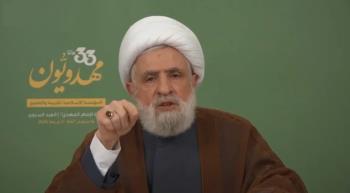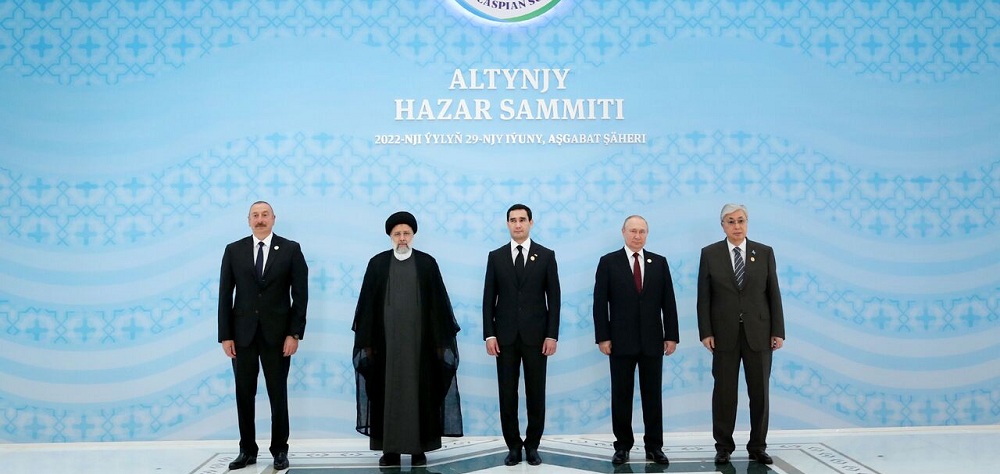Alwaght- Driven by Ukraine war, the West is pushing to crack the Central Asian states' relations with Russia and Iran. But the Western efforts are delivering the reverse and ties between regional states have grown broader in recent months. After busy diplomatic days in Tehran due to the Central Asian leaders' visits to Iran and emphasis on expansion of cooperation, now the Caspian Sea littoral countries have gathered in Turkmenistan to discuss the sea's legal status. The sixth summit was held Wednesday in Ashgabat and the presidents of Russia, Iran, Turkmenistan, Kazakhstan, and Azerbaijan attended it.
Iranian President Sayyed Ibrahim Raeisi visited Turkmenistan heading a high-ranking political and economic delegation in his first attendance of the conference. At the meeting, as at previous meetings, legal status of the Caspian Sea, border security, and the development of economic cooperation in the region were discussed.
Discussing Caspian Sea legal status
The Convention on the Legal Status of the Caspian Sea dates back to Iranian-Soviet agreements signed in 1921 and 1940 under which the two sides recognized rights for navigation in the sea.
In these agreements, there is no mention of how to use the resources of the Caspian Sea, however. They also do not specify the exact boundaries of the two sides. But with the collapse of the Soviet Union and the independence of the former republics of Turkmenistan, Kazakhstan, and Azerbaijan, controversy began over demarcation of maritime borders and the navigation and resource use extent. Over the past 30 years, 3 meetings were held. While Iran proposes 20 percent shares as a fair distribution of the sea, other countries insist on principle of littoral line length, median line, and modified median line methods for sharing.
The last meeting was held in 2018 in Kazakhstan and the Caspian maritime legal regime was signed by participating leaders. The pact saw the leaders agreeing on demarcation of sea and subsea boundaries, non-violation of width of the territorial waters for 15 nautical miles from the baseline, support to the environment, and prevention of armed forces of foreign countries in the Caspian Sea.
According to figures, the Caspian Sea has the world's largest energy reserves after the Persian Gulf, something doubling its significance. Therefore, the member states are taking steps to protect these precious resources as the world is struggling with energy shortage. Having in mind that the Russian energy is sanctioned by the West for Ukraine war, Moscow is trying to shore up cooperation with its Caspian Sea allies to use energy as a lever against the Western countries. As the cooperation of the countries adjacent to the Caspian Sea expands, so does the security in this region and therefore West's encroachments to plunder its resources are blocked.
Caspian Sea importance after Ukraine crisis
In recent months and after the war in Ukraine started, the Caspian Sea, due to its capacity in the transit has been highly regarded by countries in the region. One of the transit routes for goods from Russia to the Indian Ocean, the Caspian Sea has doubled in importance with Western sanctions against Russia.
The North-South Corridor which was unveiled two decades ago had no activity until recently. It however was activated recently and first shipment was carried from Russia to the Indian Ocean. The corridor saw a surge in its importance as Europe closed down its borders with Russia and the Central Asian states try to use it to transfer their goods to various world parts. Recently, during the visit of officials from Tajikistan, Turkmenistan, and Kazakhstan to Iran, the issue of launching and developing the railway infrastructure of Central Asia to Iran to improve transit routes was put on the agenda. With the expansion of railways between Iran and Central Asia, the process of transporting goods from both sides will be faster and can strengthen the trade in the region. During his recent meeting with the Russian Foreign Minister, President Raeisi stressed the importance of cooperation between neighboring countries of Caspian Sea region, and the prohibition of any foreign military presence in the region, and also the exceptional situation of the Iranian coasts.
Aside from the main meeting, bilateral meetings are scheduled between leaders, the most important of them President Raeisi and Russian counterpart Vladimir Putin.
Given that this is Putin's first foreign trip since the start of the Ukraine war, it is significant. Iran and Russia have always been important economic and political partners, cooperating in many areas, and this relationship has grown even more since the Ukrainian crisis.
Both under tough Western sanctions, Iran and Russia can boost economic and political partnership to frustrate destructive Western policies to crack their ranks.
The two countries also play an important role in the North-South Corridor and will try to make extensive use of this transit route for the transfer of goods in the future. Therefore, ensuring Caspian Sea maritime security and developing rail and maritime infrastructure will play an important role in bolstering their cooperation.
Russia seeks to export its products to global markets via the Caspian Sea as it is now subjected to most unprecedented sanctions by the West. Iran's location in the heart of North-South Corridor with its rail and ground transportation capacities makes Tehran the focus of Russia and Central Asian states.
Putin's attendance of the meeting is specifically significant. Amid growing concerns of Central Asian countries about the blowbacks of the anti-Russian sanctions, Putin intends to assure them that confrontation with the West cannot damage their cooperation with Moscow and partnership would keep going firmly.
The legal status of the Caspian Sea is one of the issues of concern of the littoral states. At his meetings with Central Asian leaders, Iran's president stressed and will stress expanding cooperation with regional states as a priority of his administration and as part of broader Iranian policy of "pivot to the East." Given the conditions influencing the international order, the Caspian Sea and the corridors linked to it would play a pivotal role in transit, consequently enhancing the place of Iran as a key confluence of trade routes.



























